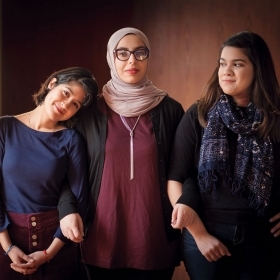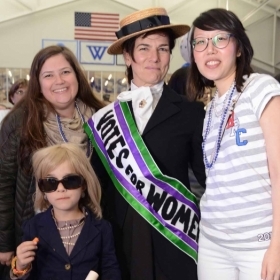When the “highest and hardest glass ceiling” didn’t shatter during the 2016 presidential election, women began to mobilize and set their sights on future races. Alumnae in politics discuss what advances—or hinders—the march toward gender parity.
Alumnae in politics discuss what advances—or hinders—the march toward gender parity in the political arena.

After she lost her historic bid for the presidency, Hillary Rodham Clinton ’69 made one message clear. Though crushed by not shattering what she called the “highest and hardest glass ceiling,” she declared there was still more work to be done.
“This loss hurts, but please never stop believing that fighting for what’s right is worth it,” she said the morning after the election. And then she issued a directive for young women coming after her:
“Our constitutional democracy demands our participation, not just every four years but all the time,” she said. “So let’s do all we can to keep advancing the causes and values we all hold dear… .”
Almost immediately, the talk turned to women running for office. Movements coalesced across the country to get women to run—including a Facebook group of more than 400 members called “Wellesley Wins” to encourage and support alumnae seeking elected office. Groups that have long advocated for, and endorsed, female candidates, such as Emily’s List and the National Women’s Political Caucus, thanked Clinton for her historic run; congratulated successful female candidates for governor, U.S. House, and U.S. Senate; and renewed their efforts to increase women’s political power by holding events, calls, and workshops around the country aimed at training more women to run for office at all levels.
Consider the numbers: As of 2015, 50.8 percent of the U.S. population was female. But in the new 115th Congress, only 19.5 percent of all members are women. There are a record number of women in the Senate, but 21 out of 100 is hardly gender parity. Nationwide, women comprise four of 50 state governors and hold just under 25 percent of legislative seats.
Where Are the Women?
So why aren’t more women serving in elected office?
From her seat as executive director of the Women and Public Policy Program at Harvard’s Kennedy School of Government, Victoria Budson ’93 is able to offer some perspectives on that question. Her work aims to break down the barriers that keep women from participating fully in all sectors of society, and one of the programs she oversees is “From Harvard Square to the Oval Office,” a nonpartisan effort to “fill the political pipeline with women” by helping female graduate students prepare to run for political office.
But it’s not easy to get there. Social change is a slow, nonlinear process, Budson says, so it’s important to recognize incremental steps. Clinton didn’t get elected president. But that doesn’t diminish the importance of her 2016 accomplishment. “For the first time in the history of the United States, we had a major party [presidential] candidate who was female,” she says. “It’s interesting to note how, as a society, we expected her to be able to break both ceilings.”
Budson believes that issues separate from either candidate’s gender determined how many Americans voted. People who felt economically strapped, despite working hard, ultimately chose Donald Trump. “When you have people who feel that they’ve done their part and can’t make it work, you get a very robust desire for change,” she says.
‘When most women consider running for office, they ask themselves, “Am I good enough? Do I know enough? Can I win?” The right question is, “What will be lost for my not having participated?”’
That meant Clinton’s long record of public service, and her many years in visible government roles, counted against her. But, Budson adds, so did being female.
“This race was typical in that the female candidate’s qualifications far outpaced the man’s qualifications,” she says. “And then much of the focus was directed toward things that were not experience- or qualifications-based.”
Gender as a factor in a campaign tends to persist only through the first two or three women who run for a position, Budson says, citing a study of female officeholders in India. “By the third woman to hold the position, people really are focused just on the policy pieces,” she adds. “You see parents in those communities wanting their female children, their girls, to aspire to political office, and the effect of bias really predominately goes away.”
What attracts women to politics, and to actually running for office, is different from what has, typically, drawn men, she says. Male candidates are often focused on the fact that they want a position, without engaging in a robust internal dialogue about whether their experience and skills are valid.
“When most women consider running for office,” Budson says, “they ask themselves, ‘Am I good enough? Do I know enough? Can I win?’ These are all reasonable questions, but they’re the wrong questions. The right question is, ‘What will be lost for my not having participated?’”
Women need to frame the question of whether to run around what they can bring to the office. “It’s about the contribution they can make,” she says. “And one of the most critical things that I work on with students is to understand the importance of truly participating in one’s authentic voice, and keeping focus on what it is that one wants to change and create.”
From Passion to Politics
Wilma Chen Chan ’71 has done just that throughout her political career. She first ran for school board in Oakland, Calif., in 1990.
“I’m very typical of a lot of women,” Chan says, “which is that we mainly ran for office because we had done a lot of community work or worked for a nonprofit, and there was something that we really had a passion for.”
In doing issue-focused work to benefit children and families, Chan says, she came to realize that if she were a part of the government, she’d actually have some power to achieve the goals she was working toward. In her case, it was to “make sure that children could have a good start in life, have a good education, and be able to do what they wanted to do, fulfill their full potential.”
School board led to the California State Assembly, where she was the first woman and first Asian-American to serve as majority leader. (She was also the first Asian-American on the Oakland school board.) She is currently the president of the Alameda County Board of Supervisors. In most of her races, Chan says, she has run against other women. She says women typically are older than men when they run the first time.
“Men, I notice, would run for office even when their wife just had a baby, or they had two young babies at home,” Chan says. “But a woman generally wouldn’t do that.”
Chan says men also often have an easier time raising money, partly because they are more likely to be dialed into deep-pocketed lobbying groups such as insurance and other businesses, but also because women tend to come into politics from nonprofit work or social causes.
Then there’s the stereotypical old boy networking, particularly when it comes to fund-raising. “Part of the problem, too, was a lot of it was socializing,” Chan says. “And most women are not going to go to a bar at midnight and hang out with some male lobbyist.”
Chan, a Democrat, says when she was in the state assembly, she faced plenty of sexism, a persistent problem she says may still discourage some women from running. For example, she remembers being completely ignored, as though she wasn’t even present, while speaking with white, Republican leaders. And when trying to rally her own party to the floor for a vote, she would also be snubbed.
“I had a colleague who I worked with, and he said to my [other] colleague, who’s a male Latino, ‘Well, I’ll come, as long as you don’t send that little Oriental girl to come get me.’ Stuff like that,” Chan says.
She has seen some improvements. A day care for staff and elected officials opened up across the street from the capitol building. Support for women’s campaigns is more organized than when she first started running for office. But ultimately, the story hasn’t changed a whole lot.
“You have to be prepared to maybe work twice as hard in the campaign,” she says. “It’s not fair, but that’s just the way it is. So just be prepared for that, and don’t get upset about it.”
First Run for Office
That was pretty much the experience Jennifer Migliore ’14 had during her inaugural campaign, for state representative in Massachusetts this fall. Migliore was a Wellesley in Washington fellow and had been an intern in Sen. Elizabeth Warren’s (D-Mass.) office. She worked on a few campaigns and then got a job in the office of her local U.S. representative, Seth Moulton (D-Mass.). In that job, she saw that her town’s needs weren’t getting the attention she thought they deserved.
‘People were always asking me what my age was. And I just feel like that does not happen with male candidates. I felt like I was constantly defending my experience.’
“There’s a number of problems within my hometown of Saugus that inspired me to run,” Migliore says—including struggling schools, traffic snarls, and environmental concerns related to an incinerator and landfill. “I just really felt that we could do better.”
So she became that rare 20-something woman running for office. After winning the Democratic primary, she went up against an incumbent who was a seasoned, older Republican man.
“People were always asking me what my age was,” says Migliore, who is 25. “And I just feel like that does not happen with male candidates. I felt like I was constantly defending my experience.”
And there was also harassment.
“After I won the primary, I had fake profiles post on my social media pages all the time,” she says. “They called my mother and me the c-word. They called me fat. Like really gross, vulgar remarks.”
But Migliore says she is not discouraged.
“There have been some young girls who have said to me, ‘You know, I want to run for office now,’” she says. “And that is just the most amazing feeling in the world.”
The Wellesley Effect
Migliore tapped something that has been important for certain women running for office up to the highest level: the Wellesley network. She came to campus for a Chelsea Clinton event last October and received a boost of support, including some students who volunteered on her campaign and donations from alumnae.
The word on the street is that Wellesley’s alumnae network is as good as (or better than) any old boy network. And for women in politics, as candidates or staffers, in Washington and outside the Beltway, it’s often true.
“We are an amazing group of women who will always help each other. We have a great, great network here,” says Charlotte Hayes ’75. Hayes has worked as a Senate staffer, as a government lawyer, as a staff member in the vice president’s office during the Clinton administration, and as a deputy assistant secretary of labor during the Obama years. She returned to the private sector at the end of November 2016, to work for Deloitte on federal consulting projects. She’s been in Washington long enough to watch multiple “flips,” as she calls them, from one party in charge to the other. And to notice some changes.
Years ago, she worked in the office of Sen. Barbara Mikulski (D-Md.) when there was only one other female senator. “Mikulski would always say, ‘This is a boys’ club,’” Hayes says. “These guys looked at her like an alien from another planet.”
But as more women got elected from both parties, their gender became both less of a distraction and something of a rallying point, Hayes says. When the number reached a critical mass, the women started to receive the respect they deserved.
“It does change everything, because their voice is big,” she says. “And they are senators, and they have to be treated with that level of gravitas and respect, because it is the highest level of office in the United States below the president, period.”
Staffers Behind the Scenes
The staff surrounding a politician also matters. Bronwyn Lance Chester ’90 has worked in the Senate for nine years, currently as communications director for the Senate Republican Policy Committee, as a member of the staff of Sen. John Barrasso (R-Wyo.), and has seen the growing roles of women on the staff there.
“I’ve seen more women ascend to senior roles in the Senate,” Lance Chester says, but points out that even years ago when she worked for Sen. John Warner (R-Va.), there were women in powerful positions.
“He had women in senior staff roles all throughout his career,” she says. “He really respected the counsel that women provided on his staff. And he valued it.”
Now, Lance Chester says, plenty of the most senior senators rely on female staff.
“Majority Leader Mitch McConnell’s chief of staff is a woman. The number two Republican in the Senate, Majority Whip John Cornyn, his chief of staff is a woman,” Lance Chester says. “So women are occupying pretty powerful roles in the Senate.”
‘We are an amazing group of women who will always help each other. We have a great, great network here.’
And she points out that if you include staff roles and compare the gender job distribution in Congress to a company, the government doesn’t look too bad.
“Capitol Hill actually does better than nearly any other sector of the economy with women managers in the workforce,” she says. Female staffers don’t actually have their names on the ballot, but they work their way up through the ranks in their field, just as people do in other work environments.
“There was an article in Roll Call last year about diversity on Capitol Hill, and the statistic they cite is that more than 36 percent of congressional chiefs of staff are women—this is of both parties—compared to 22 percent of senior managers in the private sector,” Lance Chester says.
A Changing Employment Landscape
For Capitol Hill staffers, job stability can be elusive—especially in the House, where elections happen every two years, as opposed to every six in the Senate. When candidates win, or the party in power changes, many who have proven loyal expect a job in return. Hayes anticipated that, and began her segue from the Obama administration to the private sector nearly a year before the election. She knew no matter who came after Obama, most of his appointees would be out.
Mira Patel ’05 knew that, too. She’s fresh off a stint as a fellow on the Hillary Clinton campaign, having worked her way up from an internship with Clinton at the U.S. Department of State.
“I’m in my mid-30s and unemployed,” she says, because her candidate didn’t win. But she still feels the drive to make a difference in the world through politics.
“I’m so thankful to have gone to Wellesley. It has really put the fire in my belly,” she says, “that I’m here to try and make the world a more equitable and fair place.”
Through her travels on the campaign trail and her jobs inside the Beltway, she’s seen how much more work remains, especially for people of color and for women.
“Every woman I know in Washington has a story of how her gender impeded her progress,” Patel says, “and even within progressive and Democratic movements. And that’s really, really hard, and it takes a toll after a while.”
But despite the uncertainty and the low wages, Patel maintains that it’s Important for women and people of color and LGBTQ people to participate in politics and policymaking.
“A whole bunch of white people aren’t necessarily going to be able to offer the same kind of insights that somebody of color could about racial justice or inequity,” Patel says. “And so that’s why I stay in politics and policymaking. Sometimes you don’t have a choice.”
Women Who Will …
Despite the slow trajectory, there is evidence that in this country we do, as a society, eventually accept or even embrace change. Layli Maparyan, the Katherine Stone Kaufmann ’67 Executive Director of the Wellesley Centers for Women, sees the election of Barack Obama as having had a profound impact on the nation, particularly African-American children who saw themselves reflected in the country’s most powerful person. She feels little girls deserve to see people who look like themselves in power, too.
“It’s really a missed opportunity for American society that we weren’t able to get a woman in the highest office in this most recent election. And I say that without any particular partisanship about what party she was representing,” Maparyan says.
She thinks one message of the 2016 race is that the United States is almost ready to have a female president. “People recognize on both sides of the aisle, in all of our political parties, that it really is time to show the world that a woman can lead our government,” she says.
Ultimately, this collection of Wellesley women at different points in their public service careers—including Hillary Clinton—offer a primer for any who aspire to make their mark through politics. The basics?
• Start at the bottom and persevere.
• Activate the Wellesley network.
• Be confident and constructive.
• Don’t get bogged down by the unfairness, the low pay and uncertainty, or the long arc of history.
• Never give up.
Jennifer Migliore is definitely a member of the “never give up” school. Despite her bruising experience running for state rep, she expects to run for office again.
“As millennials, we can no longer be satisfied with the status quo,” she says. “It’s really up to us to change it. And I think women are a huge part of that conversation, really trying to make this world work for everybody.”
[substory:1]
Amy Mayer ’94 covers agriculture and food production for Iowa Public Radio, and the occasional political event, too, because of the importance of Iowa’s first-in-the-nation caucuses. Amita Parashar Kelly ’06 covered the 2016 presidential Election as a digital editor and producer on NPR’s Washington desk. Liz Johnson ’01 is a freelance writer in Boston.




